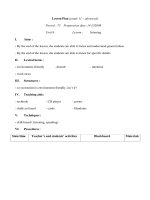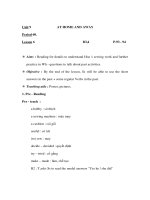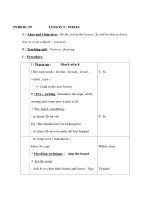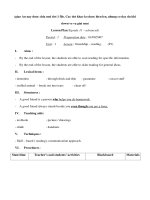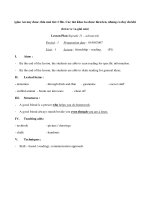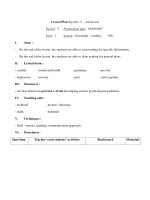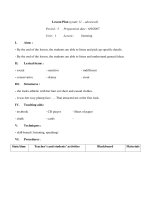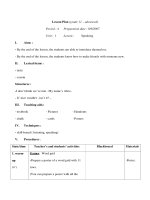Giáo án Anh văn lớp 11 - Unit 9 - Period 76 ppsx
Bạn đang xem bản rút gọn của tài liệu. Xem và tải ngay bản đầy đủ của tài liệu tại đây (23.32 KB, 6 trang )
Lesson Plan (grade 11 – advanced)
Period : 76 Preparation date :15 /1/2008
Unit : 9 Lesson : Speaking
I. Aims :
- By the end of the lesson, the students are able to ask for explanations.
- By the end of the lesson, the students know how to give explanations for actions
II. Lexical items :
- life jacket - canal - binoculars - get lost
III- Structures :
- why should tourists wear sunglasses?
- wee, the thing is, the sunlight there is very strong.
IV- Teaching aids:
- textbook - Handouts
- chalk - cards
V- Techniques :
- skill-based ( listening, speaking)
VI- Procedures :
State/time Teacher’s and students’ activities Blackboard Materials
1. warm-up
(7’)
Games: cut-up sentences.
- divide SS into small groups.
- give each group a set of cards with
phrases of sentences cut up.
- shuffle the cards and tell SS to work
in their groups and put the phrases into
sentences of a short exchange between
A and B. Then stick the exchange on
the board.
- the first group to finish and get it al
correct will win the game.
- check SS’ understanding of
instructions and have them start the
game.
- declare the winner.
- Ask SS : + what does want to know?
+ what is B doing?
- today we will practice asking for and
giving explanations for actions.
Transition:
- Today we will practice asking for
These are the sentences
and how they are cut:
- People say that /
ecotourism / is
environment-friendly /
why do / you think / it
does / harm / to the
environment?
- The thing / is / the
activities / done by / eco-
tourists/ indirect / cause /
harm / to the environment
/ and they don’t even /
realize this.
This is the exchange:
A: people say that
ecotourism is
environment-friendly. Why
do you think it does harm
to the environment?
B: The thing is, the
activities done by eco-
tourists indirectly cause
-chalk
and board
and giving explanations for actions
-Write down on the board :
harm to the environment
and they don’t even
realize this.
P 83: Unit 10 : speaking
2. Pre-
Speaking
(7’)
* eliciting and introducing Useful
language
- elicit from SS the structures used to
ask for reasons for actions and those
used to give explanations of actions.
- with a student, read the example
exchange.
* completing the brochures ( task a,
Useful language:
* asking for an
explanation
- why should (not)….?
- what …. For?
* Giving an explanation.
- because
- the thing is } +
clause
- if I could explain
- … so that
- So as to / so as not to
Chalk and
board
Textbook
p.132 – 133)
- tell SS to complete the brochures for
tourists in task a using the information
in the box and the tour guide’s notes.
- ask SS to compare answers with a
partner
- go over the answers with the class.
- …in order to/in order not
to
3. while-
Speaking.
(15’)
Activity 1: Advantages and
disadvantages – Information Gap (
task b, p. 145)
- pair off SS as A and B
- deliver cards A to students A, and
cards B to students B ( appendix 2)
- ask SS to work in pairs , talking
about the advantages and
disadvantages of the sources of
energy. SS with a gap in the
explanation will ask for clarification,
and SS with full information will
make clarification.
- model an example exchange with a
student and then have SS so the task.
- go around to monitor and note down
errors if any for correction late.
Textbook
cads
textbooks
4. Post-
Speaking
(15’)
5.Homework(1’)
- call on some close and open pairs to
act out their conversations in front of
the class.
Activity 2: personalization (task c,
p.145)
- ask SS to work in pairs, talking about
the advantages and disadvantages of
the cooking fuels and transportation
fuels currently used in their home or
neighborhood.
- act out the example exchange with a
student as a model.
- have SS start the activity.
- go around to monitor and give help
with vocabulary or ideals if necessary.
- call on some pairs to act out their
conversations and invite SS to give
comments
- give feedback and comments.
Listening:
-read out mixed expressions of how to
do something
- SS listen and write down
Sentence Making
- Ask Sts to make a few sentences
about giving instructions
